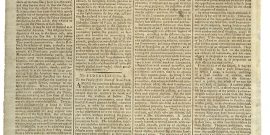The ironic result of the Federalists' efforts is that the increase in national power could actually increase overall liberty for the country.
Enduring Memories of the American Revolution
Alexis de Tocqueville metaphorized his thoughts on nations when he wrote that “the whole man is there in the cradle.” Though preceding him in life by nearly eighty years, no one could have agreed with this sentiment more than Mercy Otis Warren, the greatest historian of the American Revolution to have lived through it.
When Warren published her magnum opus, The History of the Rise, Progress, and Termination of the American Revolution, she was seventy-seven. Nearly thirty years had elapsed since the signing of the Declaration of Independence. Warren, already mature by the first rumblings of American independence, had carefully observed the development of sentiments, ideas, and actions that led to the formation of the new nation. In this work, she wove her observations into a narrative, offering a historical record and a trove of her political, social, and philosophical views. She maintained that the Revolution laid the blueprint for all potential futures for the United States—that the whole man was, in fact, there in the cradle. In reviewing Warren’s History, two things are incumbent: first, an assessment of the work itself and what the worlds of academia and public history might take from it, and second, an assessment of this particular edition of the text (in this case, the 1989 Liberty Fund two-volume edition, edited and with an introduction by Lester Cohen).
The first of these tasks is the more complicated, and as such comprises the bulk of this review. This complication hinges on the nature of this work. What is Warren’s History, exactly? What is its purpose, and separately, how might it be useful for us today? Warren purports to write a history of the American Revolution, but her work surely would not pass muster among today’s academic historians. She rarely cites her sources, and she is open with her personal and political viewpoints ranging from the predictable (any Otis or Warren, to a one, is written as a hero) to the inexplicable (her treatment of John Adams so wounded him that it irrevocably damaged their friendship). She sometimes gets her facts wrong and often editorializes. Cohen, in his introduction, heeds readers not to treat Warren anachronistically; she wrote a history using the methods of her day. In fact, that Warren gets as much right and cites as much as she does signals her remarkable memory and intellect. Still, even if a reader understands Warren as a historian of her time and not ours, the question remains: is Warren’s History useful if we cannot use it to reliably understand the facts of history as they occurred?
The answer, I think, is a resounding yes. This work continues to bear fruit when we move past Warren’s imperfect history to examine her meta-narrative, which centers not on history, but on memory, history’s much less stable and much more powerful sister. Her story is, at its core, about the way truth is forgotten and recovered, and the mission of her work is to preserve truth from being forgotten once again. Warren seeks not to record a list of disjointed events, but to preserve the sentiments and principles that gave those events significance.
This work is Warren’s attempt to establish the hunger for freedom as a core tenet of what it means to be an American.
As the title suggests, Warren’s History tells a cyclical story of birth, growth, and decay, contextualized in the grander narrative of human experience. The United States did not emerge from the ether; as Warren tells it, America was born as another country died. By the outset of the Revolution, Great Britain, the birthplace of the Magna Carta and the originator of individual freedom in the West, had forgotten what it meant to not be free. Ever-expanding in its imperialism, Britain had left behind its first principles of liberty and individual freedom for the sake of wealth and gain. As Warren puts it, “England has indeed been long celebrated for magnanimity, clemency, and humanity; but it is with nations as with individuals, when human nature falls from virtue, it generally sinks into the extremes of vice, in proportion as it was before conspicuous for superior excellence.” Once the bastion of human freedom, Britain had become an oppressor, especially in its various colonies throughout the world. And so the torch of freedom found a new bearer in the American colonies, whose acute knowledge of unfreedom launched their bid for independence.
Americans were willing to undergo great suffering to reclaim their lost liberty. Warren writes:
They were sensible that both public and private virtue sank with the loss of liberty, and that the nobler emulations which are drawn out and adorn the soul of man, when not fettered by servility, frequently hide themselves in the shade, or shrink into littleness at the form of a despot. They felt too much for themselves, and feared too much for posterity, longer to balance between either complete or partial submission, or an unreserved and entire claim to absolute independence.
It was this knowledge of unfreedom that fueled the Revolution and the Founding. Its remembrance, for Warren, would also be the necessary ingredient if America was to avoid the same fate as Great Britain. Just as Great Britain once bore the knowledge of unfreedom, used it to forge liberty for its people, and eventually forgot it, so too might the new United States. Warren is particularly suspicious of the deleterious influence of increasing wealth and idleness, which can lead to empire, and in turn, lead nations that once valued human freedom to become oppressors. In 1805, Warren was already voicing concern that Americans had forgotten what it meant to lack freedom, distracted by the pursuit of wealth and grandeur. In the birth of the United States, Warren worries that the man in the cradle is simply his father all over again.
But the man in the cradle is not only nature; nurture also plays a role in his formation. In the cradle of the Revolution also laid the passion of men fighting to be free. It is this, the knowledge of what it means not to be free, that Warren cautions Americans to preserve. To break the cycle of history, Warren warns us, we must remember. Americans must recall the loss of liberty; they must keep alive the inhumanity of oppression and remain vigilant that it does not seep into their society and politics. This is not done by way of scrupulous fact-checking, but by way of stories, songs, and lessons of morality; not accomplished by way of history, but by society, culture, and mores.
Warren, then, is less invested in the idea of history as we know it—factually accurate, pioneered by experts—than memory. Toward the end of her History, Warren writes:
Any attempt, either by secret fraud, or open violence, to shake the union, to subvert the constitution, or undermine the just principles, which wrought out the American revolution, cannot be too severely censured. … If peace and unanimity are cherished, and the equalization of liberty, and the equity and energy of law, maintained by harmony and justice, the present representative government may stand for ages in a luminous monument of republican wisdom, virtue, and integrity. The principles of the revolution ought ever to be the pole-star of the statesman, respected by the rising generation; and the advantages bestowed by Providence should never be lost, by negligence, indiscretion, or guilt.
The new United States would stand so long as it did not forget its origins. In this, Warren did not expect the new country to account for every historical detail of the Revolution; she expected it to remember its principles. Eternally flawed but eternally present, always part mythology and part fact, sometimes truer in its message than its substance, Warren understood that memory, not fact, provides our most pervasive understandings of the past.
Once one understands Warren’s project, her entire History reads as something of a meta-practice in her exact prescription for the United States. She writes for all Americans, in the hopes that her readers will use her works to remember a simple, perpetual truth—that life without freedom is inhumane—without which, America may be doomed to repeat the mistakes of its father country once again. This work is Warren’s attempt to establish the hunger for freedom as a core tenet of what it means to be an American.
Tocqueville and Warren ask the same central question: what is to be made of this new democratic world?
If Warren sought to shape and preserve American memory, this edition continues her work. Liberty Fund, as one might expect, offers an edition of this text that remains painstakingly true to the original version. Warren’s History originally appeared as a three-volume set; though the Liberty Fund edition condenses the page count into two volumes, Cohen includes numerous signifiers that allow readers to locate themselves in the original text, including the demarcation of original page numbers. Cohen retains all of Warren’s original footnotes, fleshing them out where her memory failed and correcting obvious errors, while also adding some useful notes of his own. Cohen treats Warren with great respect, evident in his editing of her work and in his introductory materials. To that end, Cohen’s introduction (and editor’s note) is as terrific a primer on Warren’s History as one can find; he situates Warren in her historical moment, details the forty-year literary career that set the stage for her most famous work, and offers important insights into the woman behind the pen.
Cohen is attentive to the text and subtext of Warren’s writing and is ready to explain her historical methodology (“like most historians prior to the twentieth century, Warren often wrote from memory”) as her political and philosophical predispositions (“liberty, virtue, and reason were, for Warren … necessary to sustain a republic”). As far as editions of this work are concerned, this iteration commits to accurately recreating the original text while also elegantly contextualizing the work within American history and political thought. This edition recommends itself to scholars and casual readers alike, and is, in my view, the quintessential modern edition of this work.
Warren may not be a historian in a way we would recognize in today’s academy; she turns out to be something far more interesting. She is a memory keeper. In observing the timeline of the American Revolution, she ends up understanding its story better than most. She is unique in this; not quite historian, not quite philosopher, not quite anthropologist, but enduringly correct in her conclusions drawn from observations. In this, I posit that Warren’s closest intellectual relative is probably Alexis de Tocqueville. Tocqueville and Warren were somewhat detached observers of phenomena, outsiders to American politics as, respectively, a French nobleman and a woman. Tocqueville and Warren ask the same central question: what is to be made of this new democratic world? Both make use of multiple disciplines in their search for answers. And, in their assessments, both Tocqueville and Warren are eerily prescient in their predictions for the future of the American political project.
But perhaps the most striking similarity between the two is their intuitive understanding of human nature. They both implicitly understand that American politics and society are not top-down endeavors but created day by day by the humble and the small. Both understood democracies, in all their facets, to be defined by their people. It is this understanding that prompts Warren to acknowledge the power of public memory, faulty and fallible as it is, and seek to establish in this memory something that will preserve the integrity of the new nation. Like Tocqueville, Warren is interested in the soft and malleable clay of human experience, which more frequently shapes the infrastructure of politics and society than the firm but heavy stone of fact.


